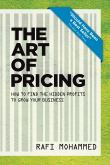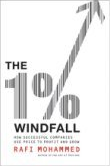The Number 1 "No No" in Pricing...
You thought I was going to say set your price by marking up costs…didn’t you? Okay, the concept of cost-plus pricing ties for number 1. However, the true number 1 “no no” is to discuss pricing in any fashion with your competitors that could be construed as price fixing.
The most famous case of attempted price fixing involves a 1982 conversation between Robert Crandall, President of American Airlines, and Howard Putnam, President of Braniff Airlines (transcript courtesy of Galland, Kharasch & Garfinkle, PC):
CRANDALL: "I think it's dumb as **** for Christ's sake, all right, to sit here and pound the **** out of each other and neither one of us making a **** dime. . . . I have a suggestion for you. Raise your *** fares twenty percent. I'll raise mine the next morning.
PUTNAM: "Robert ...we can't talk about pricing."
CRANDALL: "Oh bull****, Howard. We can talk about any **** thing we want to talk about."
The bad news for Mr. Crandall was that Putnam was recording his phone calls and he turned over this tape to the U.S. Department of Justice for investigation.
The value of your product depends on the price of its close substitutes. So if these substitutes lower their prices, the bad news is that your price and profits are going to suffer. For example, consider two gas stations, located at a busy intersection, duking it out over price…how low can prices go? You can understand the incentive to wink an agreement to maintain high prices. If you’re ever tempted to do this, my unequivocal advice is don’t: it’s both illegal and goes against the fundamentals of capitalism. And also, just to be clear, I wouldn’t tacitly signal your competitors about price either, unless you are prepared to have the Department of Justice show up at your door, warrant in hand. If your competitors are selling similar products, the bad news is that your product is becoming commoditized and superhero profits are a thing of the past. Over-the-top profits come from developing unique, hard to copy, products that customers value. This is why pharmaceuticals rank as the most profitable industry in the Fortune 500.
Last week, Sharp (Japan), LG (Korea), and Chungwa (Taiwan) plead guilty to price fixing and agreed to pay a fine of $585 million for conspiring to fix the price of flat panel screens used in TVs, laptops, cell phones, and iPods between 2001 – 2006. As a result of this conspiracy, consumers were forced to pay more for these products.
To quote the famous words of the Parker Brothers Monopoly game, the consequences of discussing your prices in public are: “Go To Jail. Go Directly to Jail; do not pass go, do not collect $200.”




